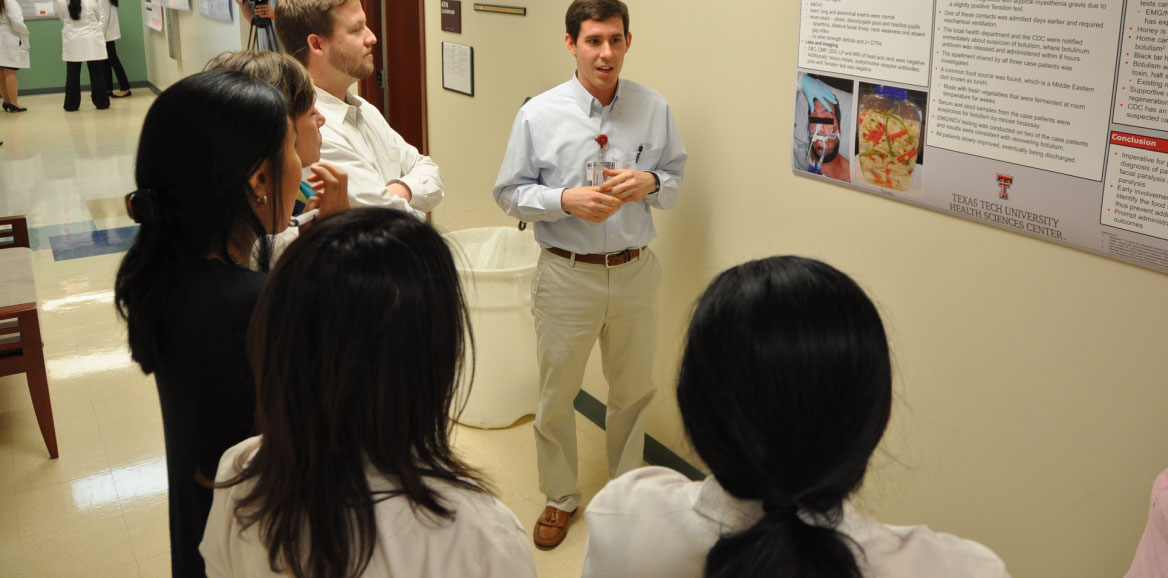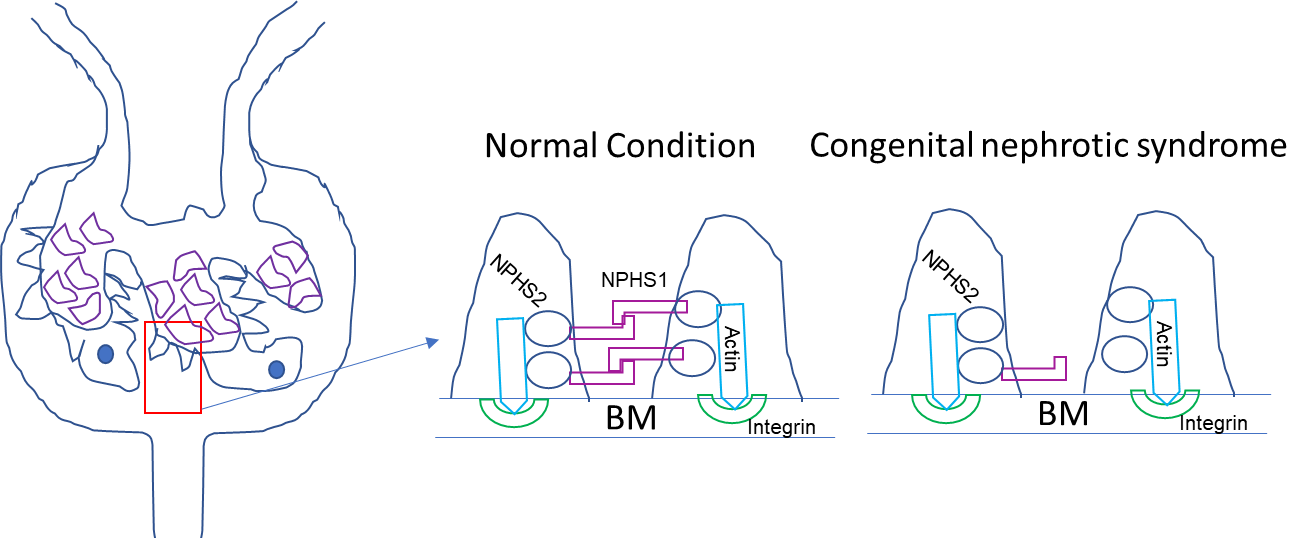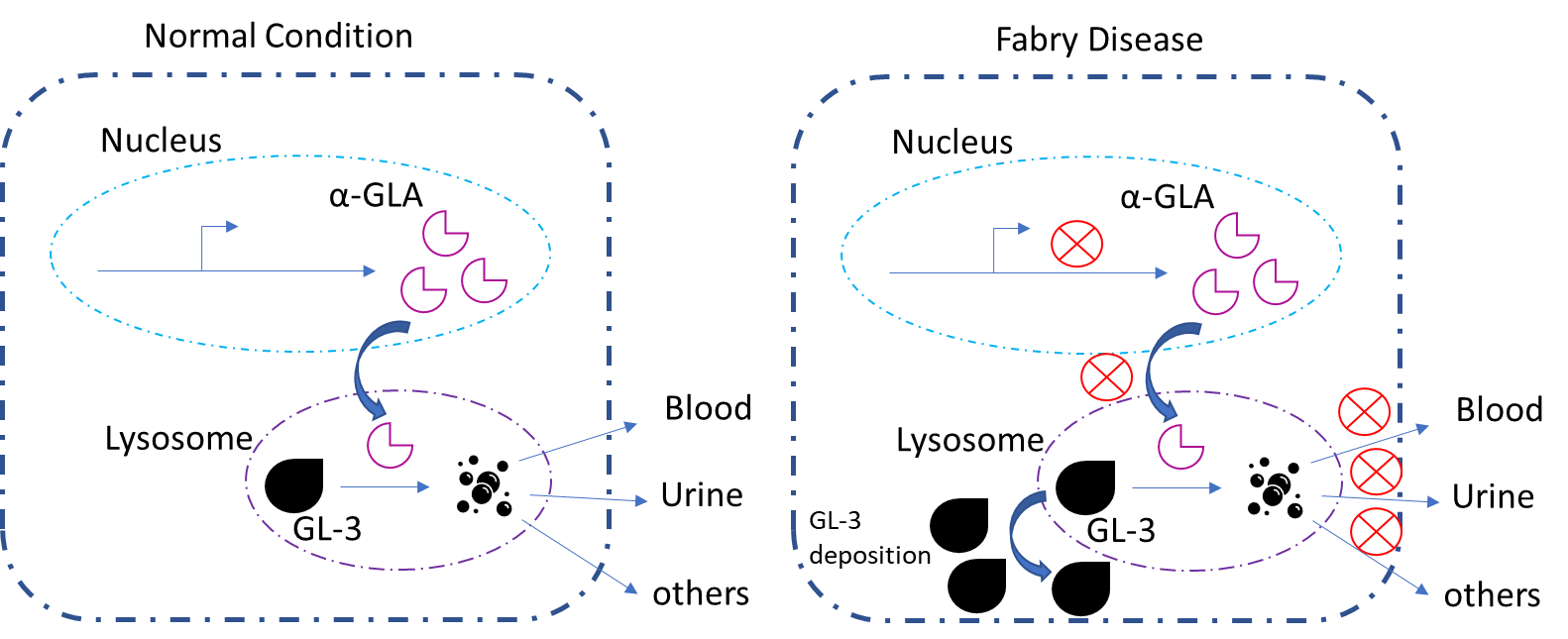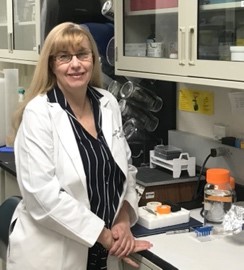Translational Research Lab for Rare Diseases and GeneHub

Unlocking the Secrets of Genetic Disorders: A Look Inside Dr. Vasylyeva's Laboratory
In the dynamic world of medical research, Dr. Vasylyeva laboratory leads the charge in discovering cures for rare and common genetic diseases of kidney like Congenital Nephrotic Syndrome, Minimal Change Disease, and Fabry Disease. Her lab deepens into cellular processes, using cutting-edge techniques to unlock molecular secrets and design targeted therapies. Beyond the lab, she fights for better access to healthcare for those affected by these lesser-known conditions. Dr. Vasylyeva's lab not only expands scientific knowledge but directly improves lives through rapid diagnosis and innovative treatments. In addition, her team’s relentless quest unravels the enigmas of rare genetic disorders, paving the way for a brighter future for many individuals battling such devastating conditions.
Research
Congenital Nephrotic Syndrome (CNS)
The kidneys function as the primary filtration unit for human body, filtering approximately 10 liters of blood each day. A protein known as the nephrin protein is a major component of the slit diaphragm within the kidney’s filtration unit. Mutation of the nephrin protein is the most common cause of CNS, a devastating kidney disease that typically develops within the first 12 months after birth. The disease currently is managed using a symptomatic approach, as there are no targeted therapeutic approaches for this disease. In a recent study, Dr. Vasylyeva’s team identified a particular intronic mutation (a genetic alteration in a specific DNA sequence) that occurs in the NPHS1 gene associated with CNS. Based on this finding, the Vasylyeva lab is attempting to reestablish the NPHS1 expression and slit diaphragm using an in-vitro kidney model in what they hope will lead to next-generation mRNA therapy for CNS.

Fabry Disease
Fabry disease (FD) is a rare X-linked genetic disorder of brought on by faulty or too few enzymes necessary to metabolize fat-like material known as lipids and their associated oils, waxes, and fatty acids. FD is generally caused by a mutation in the α-galactosidase A (GLA) gene, which in turn causes the alpha-galactosidase enzyme to malfunction, leading to the accumulation of globotriaosylceramide (Gb3) in cells and tissues. FD patients typically suffer from severe pain, gastrointestinal problems and eventually death due to kidney or heart failure. Several therapies have been attempted, but for various reasons, including delayed intervention, none are sufficient to relieve all FD symptoms. Dr. Vasylyeva’s lab is actively investigating the molecular and cellular mechanism of FD with the goal of developing better diagnostic and therapeutic targets.

Gut Microbiome and Obesity
The human body is a house of microbes, and most of these microbes are found in a pocket of the large intestine known as the gut microbiome. Scientists have conducted considerable studies of the gut microbiome over the last two decades and demonstrated that it has an effect on obesity, which is a metabolic disorder, by altering different host signaling pathways. Based on this information, Dr. Vasylyeva’s lab is currently studying the impact of changes in physical activity and food habits on obesity through the alteration of gut microbiome composition. Dr. Vasylyeva’s team also is investigating the downstream influence of the microbiome alteration on inflammation-signaling molecules — a critical event for the development of human disease — and anticipates the result will lead to identifying a specifically altered bacteria signature that could be given to the patient as a probiotic to control obesity.
Laboratory Personnel

Tetyana L. Vasylyeva, M.D., Ph.D.
Dr. Vasylyeva is a professor and physician-scientist in the TTUHSC Department of Pediatrics. Prior to joining TTUHSC, she completed postdoctoral training at Children’s Hospital Boston/Brigham & Women’s Hospital, Harvard School of Medicine. Currently, she is the principal investigator for basic science laboratory research and clinical research on several nephrological disorders. She has received numerous grants from various national funding agencies and published articles in diverse and high-impact journals.

Md Saimul Islam, Ph.D.
Dr. Islam is presently a senior research scientist in the TTUHSC Department of Pediatrics. He completed his postdoctoral training at Cincinnati Children’s Hospital and is currently investigating the molecular genetic mechanism of various nephrological diseases. He also is working to advance his research by actively submitting grants to different funding agencies as a co-investigator.

Amanda Cutts, MPH
Ms. Cutts is the clinical research coordinator for Dr. Vasylyeva’s clinical research studies. She earned her bachelor’s degree in psychology and her master’s degree in public health and currently manages and conducts specific responsibilities and activities related to Dr. Vasylyeva’s clinical trials.
Active Grants
1. Steps to the Cure: Focus on Congenital Nephrotic Syndrome. Basic Sciences Seed Grant Program, TTUHSC (2021-2022). PI, $8000
2. GZ-2017-11708 – “Novel molecular approaches for diagnosis and therapy of Fabry disease patients as supplemental to current diagnosis and enzyme replacement therapy by “Fabrazyme”. Sanofi, Rare disease (2017-2020). PI, $164,000.
3. TTUHSC School of Medicine Medical Student Anxiety/Depression and/or Teaching Learning Environment Grant Program (2020-2022), PI - $10,000.
4. CureGN: Cure Glomerulonephropathy Network. (Site PI). Sponsor:NIH-NIDDK. (2014—2019),
5. CureGN2: Cure Glomerulonephropathy Network. (Site PI). Sponsor:NIH-NIDDK. (2020—2024),
6. GIGA-kids clinical site (Site PI) in collaboration with Columbia University through Pediatric Nephrology Consortium 2014-2020.
7. Assessment of the impact on obesity in adolescent girls managed in a metabolic clinic. Seed grant from LWBIWH 9/01/2015- 8/31/2019. $20,000.
8. Treatment of Proteinuria Due to Treatment Resistant or Treatment Intolerant Idiopathic Focal Segmental Glomerulosclerosis: A 2-Part Prospective Study of H.P. Acthar® Gel (PODOCYTE) 2016-2019.
9. RLY5016-206p. A Phase 2, Open-Label, Multiple Dose Study to Evaluate the Pharmacodynamic Effects, Safety, and Tolerability of Patiromer for Oral Suspension in Children and Adolescents 2 to < 18 years of Age with Chronic Kidney Disease and Hyperkalemia (EMERALD). Relypsa, Inc.
10. A Phase 2 Multicenter, Open Label, Randomized Study of Two Titration Regimens of Oral CXA-10 in Subjects with Primary Focal Segmental Glomerulosclerosis (FSGS), Nephrology clinical trials network.
11. Natural History of Distal Renal Tubular Acidosis in a North American Cohort. Advicenne/MWPNC.
12. A Randomized, Double-blind, Placebo-controlled, Phase 3 Study of the Safety and Efficacy of OMS721 in Patients with Immunoglobulin A (IgA) Nephropathy (Artemis-IGAN).
13. A Randomized, multicenter, double-blind, parallel, active-control study of the effects of SPARSENTAN, a dual endothelin receptor and angiotensin receptor blocker, on renal outcomes in patients with primary focal segmental glomerulosclerosis (FSGS) – site PI.
Publications
1. Al-Obaide MA, Al-Obaidi II, Vasylyeva TL. The potential consequences of bidirectional promoter methylation on GLA and HNRNPH2 expression in Fabry disease phenotypes in a family of patients carrying a GLA deletion variant. Biomed Rep. 2022 Jun 24;17(2):71. doi: 10.3892/br.2022.1554. PMID: 35910704; PMCID: PMC9326966.
2. Tran TT, Linga VG, Al-Obaide MAI, Bello-Germino D, Hoda M, Adesanya O, Vasylyeva TL. Congenital nephrotic syndrome in a Hispanic Guatemalan newborn associated with a NPHS1 variant: A case report. Biomed Rep. 2022 Jan;16(1):4. doi: 10.3892/br.2021.1487
3. Mohammed A. Ibrahim Al-Obaide Ibtisam I. Al-Obaidi, Tetyana L. Vasylyeva. Unexplored regulatory sequences of divergently paired GLA and HNRNPH2 loci pertinent to Fabry disease in human kidney and skin cells: Presence of an active bidirectional promoter. Experimental and Therapeutic Medicine, 2020, 154, December 17, 2020, https://doi.org/10.3892/etm.2020.9586.
4. Alex R. Constantinescu, Tej K. Mattoo, Larry A. Greenbaum, William E. Smoyer, Jianli Niu, Scott E. Wenderfer, Noel Howard, Melissa Muff-Luett, Ali Annaim, Elizabeth B. Benoit, Avram Traum, Emilee Plautz, Michelle Rheault, Robert L. Myette, Katherine Twombley, Belkis Wandique-Rapalo, Tetyana L. Vasylyeva. Treatment of Congenital and Infantile Nephrotic Syndrome: Report from the Pediatric Nephrology Research Consortium (PNRC), PAS 2022, 58.
5. Waldrop E, Al-Obaide MAI, Vasylyeva TL. GANAB and PKD1 Variations in a 12 Years Old Female Patient with Early Onset of Autosomal Dominant Polycystic Kidney Disease. Front Genet. 2019 Feb 7;10: 44.doi: 10.3389/fgene.2019.00044Int Rep. 2021 Feb 13;6(5):1411-1415. doi: 10.1016/j.ekir.2021.02.007. PMID: 34013118; PMCID: PMC8116773.
6. Salguero MV, Al-Obaide MAI, Singh R, Siepmann T, Vasylyeva TL. Dysbiosis of Gram-negative gut microbiota and the associated serum lipopolysaccharide exacerbates inflammation in type 2 diabetic patients with chronic kidney disease. Exp Ther Med. 2019 Nov;18(5):3461-3469. doi: 10.3892/etm.2019.7943. Epub 2019 Aug 26. PMID: 31602221; PMCID: PMC6777309.
7. Vasylyeva TL, Page-Hefley S, Almaani S, Ayoub I, Batson A, Hladunewich M, Howard N, Fernandez HE, O'Shaughnessy M, Reynolds ML, Wadhwani S, Zee J, Smoyer WE, Wenderfer SE, Twombley KE; Pediatric Nephrology Research Consortium. Evaluation of the Reproductive Care Provided to Adolescent Patients in Nephrology Clinics: A Pediatric Nephrology Research Consortium Study. Kidney Int Rep. 2021 Feb 13;6(5):1411-1415. doi: 10.1016/j.ekir.2021.02.007. PMID: 34013118; PMCID: PMC8116773.
Lab News
The lab received a new seed grant from TTUHSC!
Contact:
Tetyana L. Vasylyeva, M.D., Ph.D.
Professor
Department of Pediatrics – Nephrology Section
Texas Tech University Health Sciences Center
1400 South Coulter Street
Amarillo, TX 79106
tetyana.vasyleva@ttuhsc.edu

